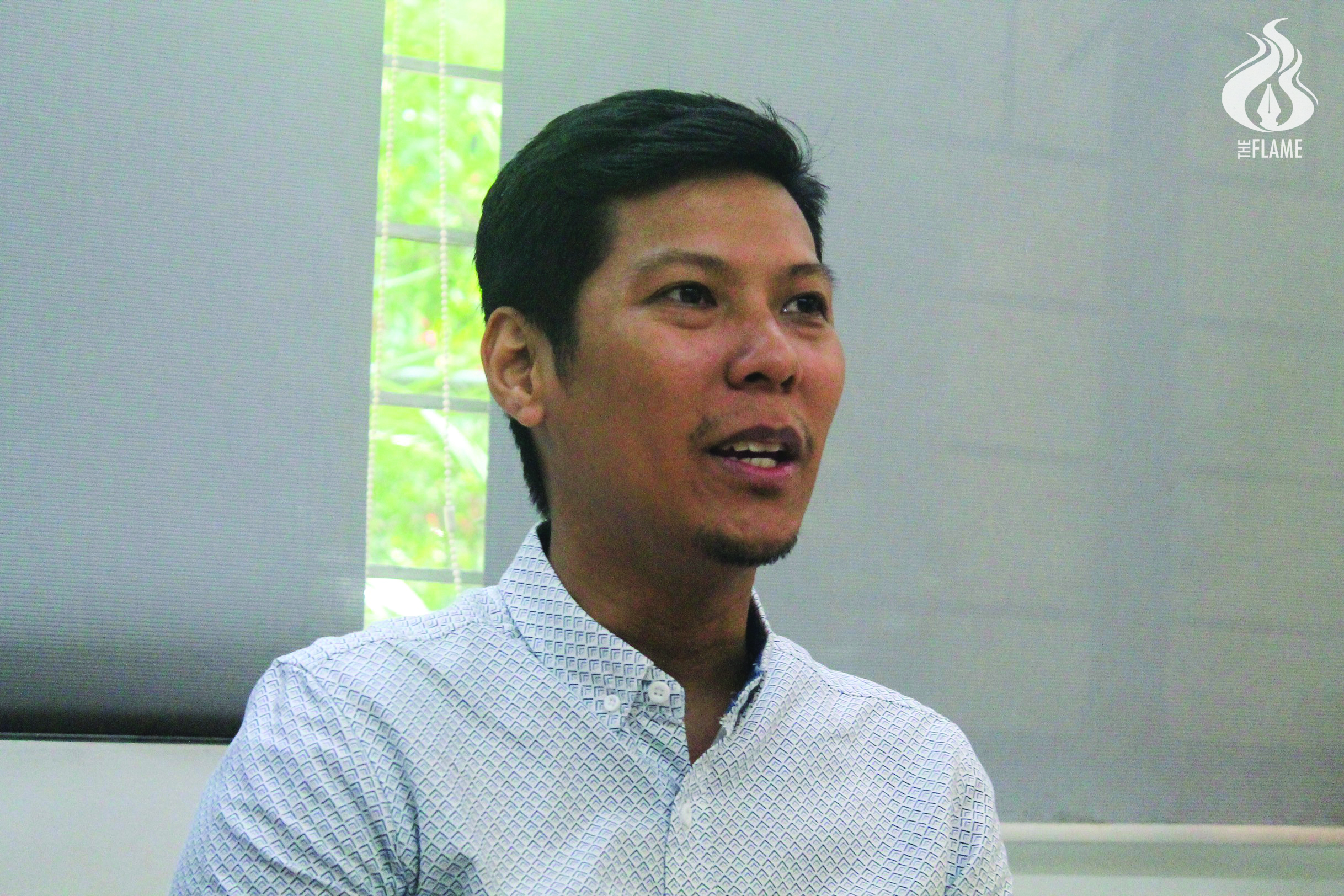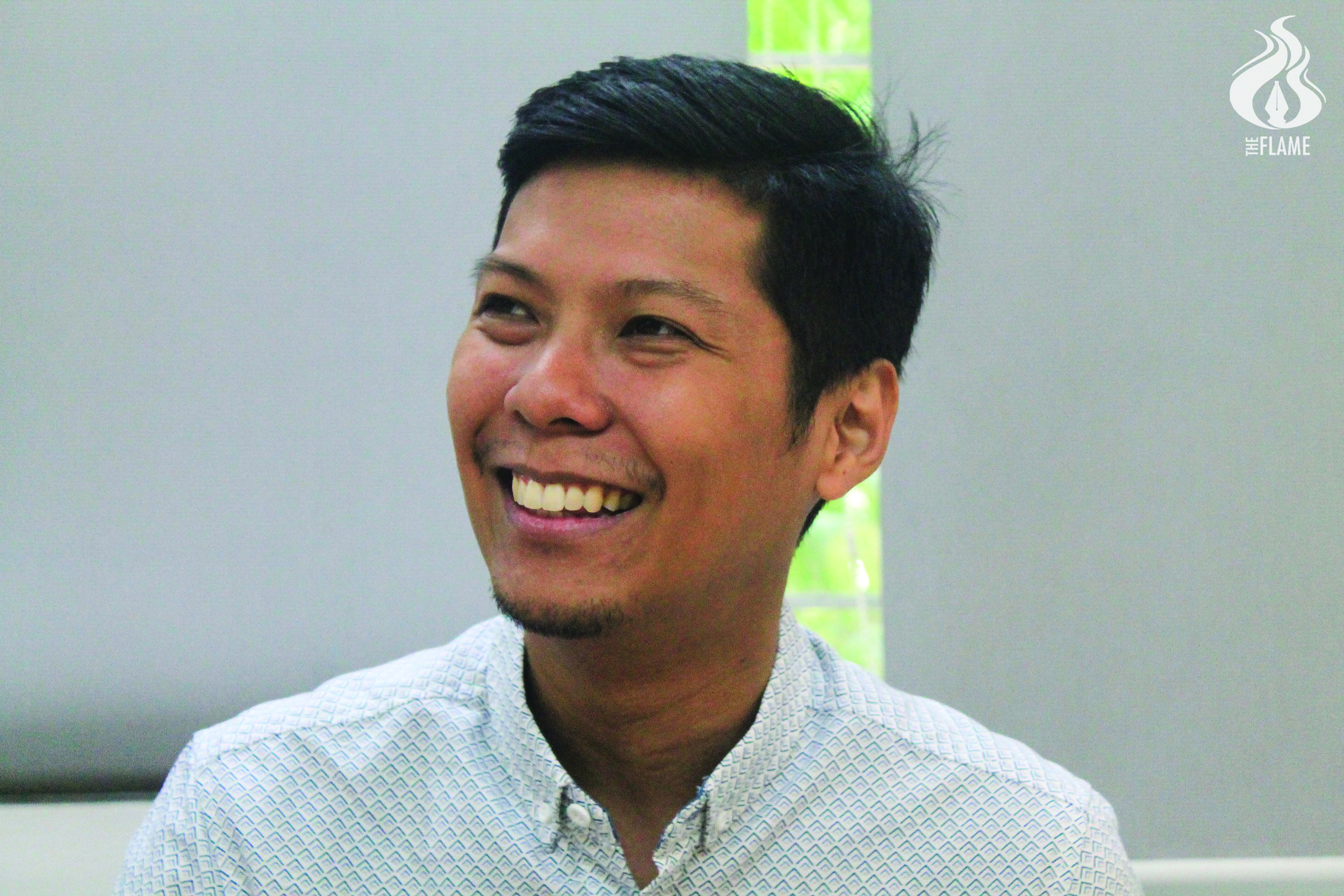
JUST AS artists have their craft, Paul Castillo has his words. He uses his passion for writing to leave an impact on the world.
While revisiting his journey, a smile appears on his face. For Paul, writing is not just a simple act of composition—writing must give back to society and be a part of history.
Despite being in his 30s, the writer ensures that he is able to incorporate the traditions of writing while keeping up with the trends of society.
Being a former NSTP facilitator and now an instructor under the Faculty’s Department of Literature as well as a resident fellow at the Center for Creative Writing and Literary Studies, Paul had the chance to view the world through a wider perspective and share it with today’s generation.
“I think I got the best of both worlds kasi may influence ako ng mga katanggap-tanggap sa younger readers and at the same time, medyo still following the model of the masters,” he shares.
Also a teacher of art appreciation and humanities at the College of Architecture, Paul considers his students’ fascination with Instagram when teaching photography. He also includes writing exercises in his class through film reviews because of his students’ love for going out and watching movies.
“You spend 250 pesos sa cinema,” he says. “Why not write something about the films you watched and will watch?”
Point of discovery
In his younger years, writing was nothing but a hobby until he got inspired by the Flame’s literary folio, Dapitan. Motivated by his desire to write like Joseph Saguid and other pioneer writers, his passion for writing grew.
“Siguro nung high school, naghahanap pa ako ng outlet, English pa noon. Sa English ako nagsimula pero Filipino ‘yung pinursue ko. […] Ibang Paul Castillo ‘yun, and siguro from there, I had this urge to write, kaya nung pagtungtong ko sa college, nabuo sa loob ko na magsusulat ako,” he shares.
After winning a literary award given exclusively to Thomasians in Gawad Ustetika during his senior year, something came over Paul; he never thought that he would achieve something out of writing.
As he went up onstage, he had already made his decision: “Sabi ko, ipagpapatuloy ko ito after graduation [and] graduate school.“
Coming from the last batch of the now-defunct Bachelor of Arts and Bachelor of Science in Secondary Education program, Paul was not well-equipped in the field of literature. As he ventured more into writing, he decided to pursue a master’s degree in creative writing. Currently, he is earning his doctorate degree in literature.
Through workshops under the Thomasian Writers Guild, he was also able to build connections with other writers and realized that his writing was leaning toward the religious.
Soon after, he explored other styles of literary writing, one of which gave him a prestigious achievement.
Coming out of his shell

After four attempts, Paul finally received a special letter acknowledging his work: he bagged first place in the Tula category of the 68th Don Carlos Palanca Memorial Awards.
“Ang gusto ko lang naman ay ang sumali [at] magpasa. ‘Di na ako nag-expect na manalo,” he says.
The poet’s winning 12-piece poetry collection, Luna’t Lunas, was an example of his exploration of other writing styles.
The idea for his work came about during his Lucban trip with his fiancée. They were passing by Mt. Banahaw when they saw rows of angel’s trumpets or kalampunay plants.
“Lagi naming pinag-uusapan kung ano ba ‘yung effect, kung mas malala ba siya kesa marijuana,“ he recalls. “Since meron pala tayong ganito, naisip ko na gagawa ba ang Diyos ng nakasasama sa tao, na nakakalat lang sa nature?”
What was then a simple conversation eventually led to more pondering. He became inspired to make poetry out of plants and medicinal herbs.
Paul also shares that when he started his work, he was further motivated to continue exploring writing despite the topic being beyond his knowledge.
After Luna’t Lunas, the litterateur plans on starting another passion project: a memoir about NSTP. Since it will focus on community work, he plans to approach it through a lens that tackles issues like poverty and other hardships surrounding a poor community.
An avenue for change
Paul admits that being a teacher and a writer does take up a lot of his time, yet he continues writing and balancing his priorities. He encourages young writers to read, publish, and share their works.
Paul shares that understanding readers makes a good writer. He describes a writer as someone who is generous with dropping subtle hints, no matter how difficult the piece may seem.
“[I]isa lang naman ‘yung pinagmumulan ng ating consciousness and I think that a good writer always taps into that consciousness of his readers,” he shares.
For Paul, writing is more than merely putting words to paper; rather, it opens the senses of the readers.
“It’s up to them how they let these literary works open their minds and even their hearts to take action and heed the call of these writers na dapat kumilos din tayo and do something about what is happening around us. The writer and society go hand-in-hand in creating change,” he proclaims. F



